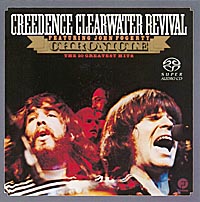Fogerty Facts
In 1968, rock and roll was brought sharply back to its roots due to one album, Creedence Clearwater Revival. Led by the band’s lead singer, John Fogerty, CCR’s style reminisced back to the says of country, blues, and swamp-rock. The vision behind CCR is attributed to much John Fogerty's singing, songwriting, leadership, and guitar skills. Fogerty's compositions managed to evoke images of the utopian America as well as the inherent social issues of the time.
John, and his brother Tom, formed the band Tom and the Blue Velvets in the late 1950’s while staying in El Cerrito, California. They changed the band’s name in the mid sixties to The Golliwogs, but their popularity did not rise. It was not until John Fogerty took over the reigns of lead singer and front man, of the newly proclaimed Creedence Clearwater Revival, did the band become successful.
They released their debut album in 1968, and soon they had ten hit singles.

Some of these singles were “Proud Mary,” “Down on the Corner,” “Susie Q,” and “Who’ll Stop Rain.”
Unfortunately, Fogerty’s dominance of the group sowed seeds of disunity and mistrust. Tom Fogerty left the band in 1971 after expressing dislike at his brother’s upper hand in any decisions. This left CCR as a trio, and John agreed to allow drummer, Doug Clifford, and bassist, Stu Cook, equal shares of vocal time and songwriting on their next album, Mardi Gras, in 1972. The other band members protested, and said that it wouldn’t be a true Creedence album. They believed the fans would not understand. John replied, "My voice is a unique instrument and I will not lend it to your songs." He threatened to quit the band immediately if they did not agree to this. Mardi Gras turned out to be their last album, and Fogerty bought himself out of his contract and officially left the band.
Fogerty began his solo career under the name “Blue Ride Rangers.” For his 1973 debut, he played all of the instruments used and compiled an album of instrumental covers. He released John Fogerty in 1975, but sales were slim. Also, at this time, legal problems ensued. Creedence Clearwater Revival's former music publisher, affiliated with Fantasy Records, sued Fogerty because his new compositions sounded too much like his former work as songwriter for CCR.
 Later, in 1985, when Fogerty’s solo career finally hit its peak, he released the album, Centerfield. It went to the top of the charts and included the Top Ten hit, "The Old Man Down The Road" and the title track is frequently played on classic rock radio and at baseball games to this day. However, Fogerty ran into more legal problems with this album. It was believed that two songs on the album, "Zanz Kant Danz" and "Mr. Greed", were attacks on CCR’s former employer at Fantasy Records, Saul Zaentz. "Zanz Kant Dance" was about a pig that can't dance but would "steal your money". Zaentz responded with a lawsuit, and Fogerty issued a revised version of "Zanz Kant Danz,” and changed the main characters name to Vance. Another accusation was that "The Old Man Down The Road" shared the same chorus as "Run Through The Jungle,” one of Fogerty’s hits while with Creedence. Fogerty won the case by proving the two songs were wholly separate and distinct compositions. He brought his guitar to the witness stand and played excerpts from both songs, demonstrating that many songwriters (himself included) have distinctive styles that can make completely different compositions sound similar to the ear.
Later, in 1985, when Fogerty’s solo career finally hit its peak, he released the album, Centerfield. It went to the top of the charts and included the Top Ten hit, "The Old Man Down The Road" and the title track is frequently played on classic rock radio and at baseball games to this day. However, Fogerty ran into more legal problems with this album. It was believed that two songs on the album, "Zanz Kant Danz" and "Mr. Greed", were attacks on CCR’s former employer at Fantasy Records, Saul Zaentz. "Zanz Kant Dance" was about a pig that can't dance but would "steal your money". Zaentz responded with a lawsuit, and Fogerty issued a revised version of "Zanz Kant Danz,” and changed the main characters name to Vance. Another accusation was that "The Old Man Down The Road" shared the same chorus as "Run Through The Jungle,” one of Fogerty’s hits while with Creedence. Fogerty won the case by proving the two songs were wholly separate and distinct compositions. He brought his guitar to the witness stand and played excerpts from both songs, demonstrating that many songwriters (himself included) have distinctive styles that can make completely different compositions sound similar to the ear.Later, John Fogerty sued Zaentz for the cost of defending himself against the copyright infringement case. Fogerty v. Zaentz became precedent when the U.S. Supreme Court overturned lower court rulings in 1993 and awarded attorneys' fees to Fogerty, without Fogerty having to show that Zaentz's original suit was frivolous.
Fogerty followed up his success in 1985 with another album in 1986 entitled Eye of the Zombie. It was not merely as successful as it’s predecessor. Because of his albums failed success, Fogerty disappeared from the limelight until 1993 when Creedence Clearwater Revival was inducted into the Rock and Roll Hall of Fame. However, Fogerty refused to perform with his former band mates in retaliation with their siding with Fantasy Records during the copyright trials.

2004, marked a turning point in the life of Fogerty. He released another album, Déjà vu (All Over Again). Also, Fantasy Records was sold to Concord Records, which quickly ended to thirty-year fight between Fogerty and his former label. The new owners took steps to restore the royalty rights Fogerty gave up in order to be released from his contract with Fantasy in the mid 1970s. Finally, on June 9, 2005 Fogerty was inducted into the Songwriter’s Hall of Fame, and in September he returned to Fantasy Records to release another recording.
John Fogerty has had a long and strenuous career. He was a musician who wanted to express his back to roots rock, and write music that made a statement during a turbulent time. However, due to the complications of his record company and former band mates, his career was spent defending his creativity. His genius inspired waves of musicians later in rock history, and will forever.
Works Cited
Bordowitz, Hank. Bad Moon Rising: The Unofficial History of Creedence Clearwater Revival. Schirmer Trade Books.1998.
Creedence Clearwater Revival Biography
Creedence Clearwater Revival Free Music Downloads
Fogerty vs. Fantasy Inc.
NPR: John Fogerty travels ‘The Long Road Home’

7 Comments:
do you guys like my pictures? lol
Jeremiah was a bullfrog. duh duh duh.
I grew up around CCR and Fogerty type music, so this was really interesting for me.
And yes, the pictures added a nice touch.
Very nicely done! Informative, and not boring.
Very informative. I liked the pictures, nice touch.
nice vocabulary, sounds very professional
john fogerty deserves everything he has. and more. probably one of the most famous rock'n'roll family/record label/money feuds of all time.
How can somebody who's so well informed about John Fogerty's just simply leave out his best solo album to date, Blue Moon Swamp, Grammy awarded best rock album of '97?
Oops. I probably missed the point of this column...
Post a Comment
<< Home